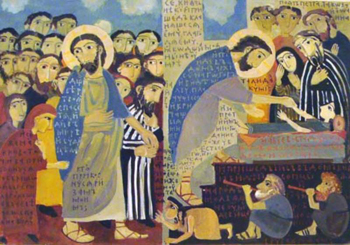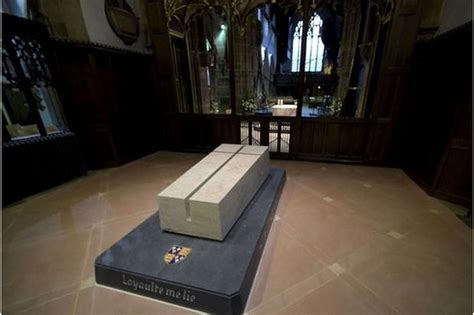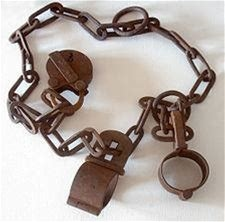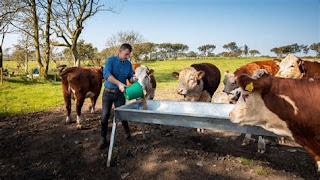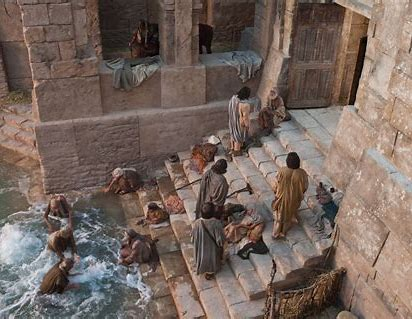Tuesday Morning Worship 11th June 2024 St Oswald's Rugby
Mark 3.20-35
What type of sandwich do you like?Mark also like sandwiches, but not the sort that you eat.
Scholars studying Mark’s Gospel discovered that Mark uses a
literary device where a narrative is interrupted by an apparently unrelated
story, which then returns to complete the original narrative. This technique is
known as “interpretative intercalation” or simply put, “sandwiching.” It’s used
to highlight certain themes or teachings by juxtaposing two different stories
that, upon closer examination, reveal a deeper connection or truth.
That might sound a bit technical but once you see it, it
does bring a fresh understanding to reading the text.
Our Gospel reading today, Mark 3.20-35 in one such
sandwich.
A key verse is verse 31, ‘Then Jesus’ mother and
brothers arrived. Standing outside, the sent someone in to call him.’
So, Jesus is inside, and his family are outside.
Let’s look at verse 20 to discover where Jesus is…
‘Then Jesus entered a house, and again a crowd
gathered, so that he and his disciples were not even able to eat.’
They are, if you like, the two slices of bread.
In the middle we read first of his families concern for
his mental health and wellbeing.
Some teachers of the law have been dispatched from
Jerusalem and have made the long trip up to Galilee to see just who Jesus was
and what he was teaching and doing. And by inference we see that this is
because Jesus’ didn’t have the authorised credentials.
Jesus’ response is to speak in parables and to point out
the basic flaw in their argument that he is in league with Satan. Because what
Jesus is doing is releasing people from Satan’s grasp and grip.
Jesus is the strong man who after his anointing at his
baptism was driven into the desert and there confronted the Satan and defeated
him. In effect he tied him up and Jesus
is now plundering his house and releasing Satan prisoners.
From Luke 13…
“You
hypocrites!” the Lord replied, “Does not each of you on the Sabbath untie his
ox or donkey from the stall and lead it to water? Then should not this daughter
of Abraham, whom Satan has kept bound for eighteen long years, be released from
her bondage on the Sabbath day?” When Jesus said this, all His adversaries were
humiliated. And the whole crowd rejoiced at all the glorious things He was
doing.…
And then this curious verse about the unforgiveable sin –
which is not really that difficult to grasp in context.
Simply put, if Jesus, through the Holy Spirit is bringing
health, healing, wholeness, release, and forgiveness of sins – then to turn
around and blaspheme that same Sprirt and to call it out as being of Satan is
to put yourself in a place where you are unable to receive any such forgiveness
and new life.
If you are ill and the doctor prescribe some tablets but
then refuse to take them and you remain ill – you see the logic of this
argument and the thrust of this verse. Which ties back up with the comments of
the teachers of the law claiming Jesus was in league with the devil.
We return then to verse 20 and the outer layer of the
sandwich.
‘Then Jesus’ mother and brothers arrived.
Standing outside, the sent someone in to call him.’
Remember, we have those inside and those outside.
So, just who are those inside.
And the answer to that is key to what Mark wants to tell
us, what Mark wants us to grasp, what Mark wants us to embrace and understand.
Mark wants us to
become ‘insiders’ – and tells us how we can do that.
“Who are my mother and my brothers?” Jesus
asked.
Then he looked at those seated in a circle
around him and said, “Here are my mother and my brothers! Whoever does God’s will is my brother and
sister and mother.”
Whoever does God’s will is my brother and
sister and mother.”
And thereby, by inference, anybody who does God’s will are
also brothers, sister, mothers and fathers to each other, all part of the new
family Jesus is creating.
And I am sure you will be fully aware of just how
important the family was in the time of Jesus and in that culture.
I’m not going to unpack that anymore but leave for us to
meditate and ponder over, simply offering you a few pointers.
The big question is, are we on the inside or the outside.
If we are on the inside how much do we feel we are part of
God’s family?
(Let’s dismiss the concept of the Western nuclear family
and think much broader and wider)
A tricky bit is when you have part of your natural family
who are ‘inside’ and part of your natural family on the ‘outside.’ They may well think that you are out of your
mind. Why bother going to Church when it is a lovely day and we can do so many
other things.
Getting that balance right is not easy and Paul addresses
this with regards to marriage in 1 Corinthians 7.
“Who are my mother and my brothers?” Jesus
asked.
Then he looked at those seated in a circle
around him and said, “Here are my mother and my brothers! Whoever does God’s will is my brother and
sister and mother.”
Well, are we – are we seeking to do the will of God in all
things, at all times, and in all places in each and every situation.
Now that’s something to ponder on and presents us with a
real challenge and the need to call upon the Holy Spirit to help, aid and guide
us as Jesus invites us to follow him and become part of God's family.
https://youtu.be/S-Bq1YtpQL8?si=g34aY8IluAQ6NpBP
Will you follow me....
